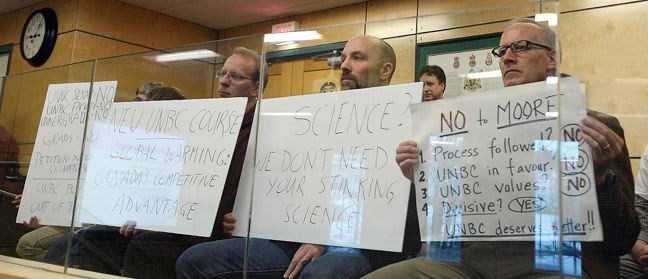A week after protesters brought anti-James Moore posters to a University of Northern B.C. board meeting, its chair sent a lengthy email defending the new chancellor.
Ryan Matheson began his Friday email to faculty and students saying the Board of Governors had listened to the opposition and "reconsidered" its position selecting Moore, but ultimately chose not to reverse its decision.
"The board gave a great deal of thought and consideration to this decision," started Matheson's almost 1,100-word address. "While we have heard the objections, we have also heard from leaders across all areas, including alumni, faculty, students, government, and business, who have applauded and support this appointment."
Matheson has been defending the decision since the day after it was announced in November, when an anonymous school senator posted an online petition to toss the former federal cabinet minister as UNBC's figurehead.
Despite the board's January affirmation, opponents have repeated their position that Moore is not a fit for the green university.
Both student associations produced internal polls opposing the choice, though the undergraduate group opted not to make a formal complaint and instead move forward as it didn't "want to see our university community divided over this issue."
On Tuesday two university associations added their voice to the fray, calling on Advanced Education Minister Andrew Wilkinson to investigation the board's approach to Moore's appointment.
"The substantive concern about Moore is his leadership role in a government that was antithetical to the values of science, evidence based public policy and academic freedom," said David Robinson, Canadian Association of University Teachers (CAUT) executive director, in a statement with the Confederation of University Faculty Associations of British Columbia (UFABC).
In his email, Matheson addressed two key threads of criticism:
Does Moore make the cut for merit?
In the first seven paragraphs, Matheson laid out Moore's political resume.
"One cannot ignore the commitment required to serve Canada as a Member of Parliament and Cabinet Minister. Mr. Moore was the youngest MP ever elected in B.C., and the youngest Cabinet Minister in B.C.'s history when he was named Secretary of State..."
He said Moore's accomplishments were "significant," calling him the "driving force" as Industry Minister behind the Canada First Research Excellence Fund, with a $1.5 billion pot for post-secondary institutions to "contribute to long-term economic successes for Canada."
As Heritage Minister, Matheson said Moore "established two new national museums": the Canadian Museum of Immigration in Halifax and the Canadian Museum for Human Rights in Winnipeg.
"Mr. Moore has demonstrated considerable dedication to public service, a dedication that he has pledged to bring to UNBC as chancellor," said Matheson, who again noted Moore was one of few in the Conservative Party caucus to vote in favour of same-sex marriage.
"I know that he is eager to come to UNBC and be an active participant in discussions around diversity and inclusion."
Did UNBC follow the proper process for appointment?
CAUT, CUFA BC, UNBC's Faculty Association, its graduate student association and the university's senate have all said the board did not properly consult the Senate when appointing Moore, a requirement laid out in the University Act. Senate said it learned Moore had been recommended a few weeks before the choice became official.
Matheson reiterated the process but did not specifically address the issue of consultation with senate.
"Some have gone so far as to suggest that Mr. Moore is ineligible to hold the position because he was a sitting MP during the nomination process. This concern is without merit."
Matheson said he and the board recognize many have been dissatisfied with the selection process.
"We will revisit the selection process for future chancellors, and engage with the university to clarify the various roles, and determine means by which we can engage further, and assuage the concerns that exist, especially from Senate."
Moore is "keen to meet" with the university community, Matheson said, and "speaks passionately about his experiences at UNBC, and is a proud graduate who attributes his time here, including his education and relationship with professors and fellow students, to having a profound impact on his life and success in leadership."


